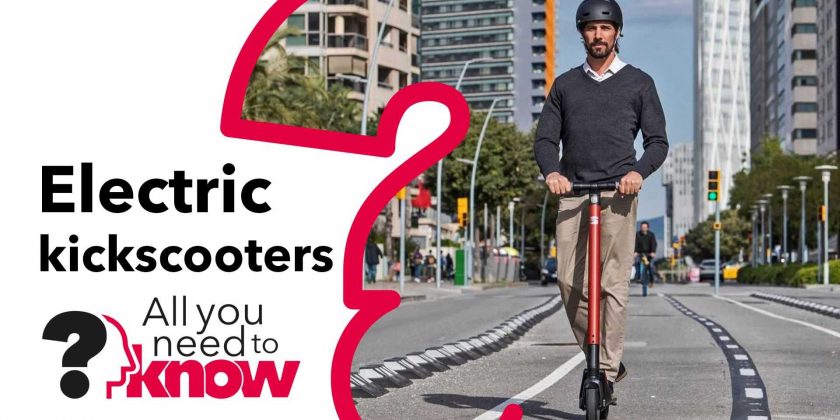Love ’em or hate ’em, they’re probably here to stay.
There’s a quiet revolution taking place in our city centers, but depending on who you ask, it’s either an annoying fad or the future of urban transportation. Here are six things you need to know about e-kickscooters.
They’re part of a micromobility revolution
Cheaper than the bus, more convenient than a bike and less sweaty than walking, the electric kickscooter has become a useful addition to a widening range of transport options, all designed to help cities from Paris to Portland move its millions of residents in a socially responsible way.
E-scooters are considered part of a far bigger movement called ‘micromobility’, which promotes battery-powered, utility-based transportation solutions that weigh less than 500kg.
With 50% of all European urban car trips being completed within a radius of three miles*, the plan here isn’t to have people switch from riding and walking to micromobility. The plan is to replace single-occupancy cars, where pollution, congestion and the proportional use of energy per trip, is much higher.
It is BIG business
The electric kickscooter landscape is a lot bigger than you may think. San Francisco startup Lime boasts a bigger fleet than FEDEX and completed 100,000,000 rides in its first two years of business. In 2018, emerging LA e-scooter business Bird was given a billion-dollar valuation faster than Uber, AirBnB or Facebook.
Cities across the globe are finding smartphone-based e-scooter services an affordable and user-friendly solution for its residents in the so-called ‘last mile’ conundrum. Simply download the app, point your phone at the scooter’s QR code to unlock, and off you scoot with rent-by-the-minute freedom, often limited to 15mph.
Even carmakers are at it
A combination of tasty carrots in the shape of new, exciting e-scooters, not to mention pointy sticks in the form of congestion charges and vehicle taxation, is making urban residents think that owning a car may be more hassle than it’s worth. Carmakers are seeing their traditional business models evaporate right in front of them, and that is a BIG problem. Now, they too must fight to stay relevant, figuring out new ways to sell cars, but also developing other products and services today’s consumer may want.
And if you can’t beat them, then companies like the Volkswagen Group are joining them. They’ve created SEAT Urban Mobility, a new, group-wide business unit that’s exploring peer-to-peer car sharing, ride-hailing software and, you guessed it, electric kickscooters. The SEAT EXS is a kickscooter that was first presented in 2018 and has already sold 10,000 units in Spain
They create a lot of clutter
The future may be cleaner, better connected and more convenient, but it’s also really messy. As scooter companies have competed for dominance, they’ve often flooded cities with surplus e-scooters, reaffirming their brand but also really annoying local residents.
In some cities, shared electric kickscooters continue to be unregulated, allowing operators to throw as many onto the street as possible. In this scenario, few companies if any, stand a hope of becoming profitable. There have been other issues too, including accidents, theft and vandalism. All of which has encouraged tougher governmental regulation and fines.
Cities including Berlin and San Francisco, now require scooter companies to have an operating permit and are limiting the number of e-scooters they can supply.
They’re not very good at making money
Truth be told, e-scooter companies have struggled to make money for a long time, mainly due to the high purchase price of scooters, the low rental prices needed to stay competitive, and the higher-than-anticipated costs associated with replacing damaged scooters – something the industry calls ‘unit economics’.
And this was before the coronavirus pandemic. Now, with the vast majority of fleets having sat unused for the last few months, many of these cash-starved companies have burnt through their venture capital funding and are now on the brink of collapse. So far, Lime has been the only scooter company to raise cash during the crisis, through a deal with Uber, but this has meant a revised valuation of around $500m – nearly 80 percent less than its value in 2019.
Popularity may increase
As the world slowly returns to a new kind of normal, E-scooters could still have their moment in the sun. Funding for areas such as public transport may have taken a hit, but governments are still keen to encourage a shift to clean transport with policy changes such as the introduction of cycle lanes. Remember that Amsterdam wasn’t always a bike nirvana… If commuters remain keen to maintain social distancing and avoid public transportation for the foreseeable future, perhaps privately-owned bicycles and e-scooters could provide an answer to developing a cleaner, greener transport economy?
Source: Read Full Article
